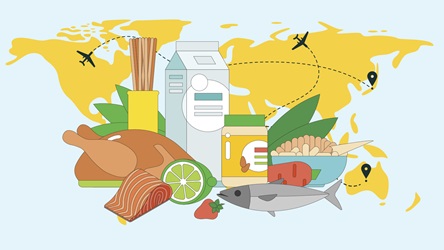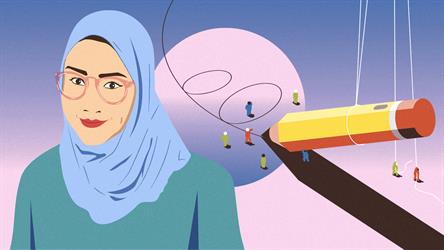How Openness Strengthens Relationships
 Mr Agrim Singh, a first-year university student who loves to code, used to think that the Singapore government was “rigid” and would be tight-lipped about sharing its data.
Mr Agrim Singh, a first-year university student who loves to code, used to think that the Singapore government was “rigid” and would be tight-lipped about sharing its data.
But his experience at the E3 (Energy Efficiency for Everyone) Hackathon in September 2013 was anything but.
For starters, the hackathon – supported by the Energy Market Authority (EMA) and Singapore Power – shared a tranche of never-before released energy statistics that thrilled data geeks like him.
Millions of electricity and gas household consumption records were made available to hackathon participants who had gathered to develop solutions for energy efficiency and lowering home energy consumption. The participants included data scientists, researchers, academia, software developers and entrepreneurs. Event organiser, Mr Ciaran Lyons of UP Singapore, called the data release a “real commitment to openness”, adding that this was, to his knowledge, the largest dataset shared at hackathons worldwide.
Being so open and on such a large scale was initially unsettling for some at EMA and Singapore Power, admitted EMA Analyst Ong Yu Hui. To allay concerns, the EMA team took pains to develop techniques (called “data anonymisation”) to protect individual consumer or household identities.
“We didn’t want to be too conservative and restrict a lot of information,” said Ms Ong, so they made sure data provided was granular enough to be useful for participants in developing app prototypes. For example, electricity and gas consumption data was shared at the household level.
Be courageous in sharing
Being able to anonymise data is now giving cautious government agencies the courage to share richer data as they support or organise more hackathons. These events bring interested members of the public together for a few days to build software applications that tackle real-world challenges.
Government agencies say hackathons spur innovation while encouraging citizens to be proactive about solving common problems. “Some of the ideas that eventually came out [from the E3 Hackathon] were enterprising and surprising,” said Mr John Chong, Principal Analyst, EMA. One example was a Web portal that encourages children to save energy by letting them compare and compete on how energy efficient they are at home and in class.

A brave step
The first public agency in Singapore to hold a hackathon was the National Environment Agency (NEA). It held its first event in April 2013 where it pioneered data anonymisation techniques to unlock fresh data. For instance, by leaving out the unit numbers of dengue breeding households living in public housing, NEA was able to share dengue hot spots down to specific blocks.
“I think that NEA was incredibly brave to [be the first public agency] to organise the hackathon,” said Mr Lyons, whose company was the event partner. “Looking just at the data that NEA released – littering information, lapses in food hygiene, air quality – this could be interpreted as ‘dirty, tainted’ Singapore, not ‘clean and green’. But the open and transparent way it was handled encouraged solutions, not complaints.”
Ms Sueanne Mocktar, Senior Deputy Director of NEA’s 3P Network Division, said that the first NEA hackathon was particularly “challenging”. Before they could anonymise data, the team had to get their hands on very detailed data (in coding parlance, “granular data”) that developers would find useful, for example, daily temperatures by the hour.
Historically, NEA’s public data have been aggregated, for example, to a daily average. “Our colleagues would ask us, ‘Isn’t this granular enough?’ [We had to tell them] ‘No… sorry, it’s not.’ You have to break it down, hour by hour, day by day, for example,” said Ms Mocktar.
They plodded on and managed to release new datasets for its first hackathon. The hard work was worth it, she said, because unlocking the datasets communicated the agency’s sincerity in “wanting to solve issues and not just giving lip service to open data, open collaboration”.
Buoyed by the positive feedback from the first hackathon, NEA staff were much more open-minded and better prepared to provide granular data for the second hackathon, which was held six months later.

Interact closely
But it’s not just richer data that’s warming up the relationship between government and people.
Mr Singh said it was the interaction with public officers during both EMA and NEA hackathons that made a difference. “We managed to get some of our ideas validated, some questions on existing pilot programmes answered, and enjoyed a vibe that suggested that we were brainstorming solutions with the government, rather than doing it for them,” said the coding enthusiast from the team, Wish Lit, whose app won the E3 Hackathon’s top prize.
Entrepreneur Niko Tan, who took part in an NEA hackathon, said he now sees the government as a partner that offers citizens “the opportunity to make a difference and create something for the community” through its hackathons.
After the hackathons, the EMA and NEA staff stayed in touch with some developer teams to incubate their ideas. NEA also gave funding support and linked teams up with its operational departments for “on the ground” advice. Both agencies said the hackathons and the ensuing incubation journey took their engagement with the public to a much deeper level.
Mr Tan, who won a consolation prize for a food waste recycling system, said: “The government is not as distant as before. After the hackathon, we managed to reach many [public officers] and developed our idea further.” This willingness to call or email for more data or help shows that NEA has created more trust with the developer community, said Ms Mocktar.

Deliver a promise
Mr Lyons pointed out that Dr Vivian Balakrishnan, Minister for the Environment and Water Resources, had challenged “the participants to request more and more data from the government” when he concluded NEA’s hackathon in April 2013.
This promise was made good three months later when the haze situation turned severe. Mr Lyons was able to forward direct requests from the developer community to the right parties in NEA. More significantly, the microsite (haze.gov.sg) was launched, with real-time, machine-readable air quality data, as well as historical archives – stuff that developers need to create air quality monitoring apps. “That showed me the community’s concerns were really heard,” he said.
For Mr Singh, the relationship with government officers and agencies has turned out much better than he expected. “Officers [now] know us by name and are usually the ones initiating conversation, offering the latest insights and datasets for us,” he said. “If this is anything to go by, the process of co-creating solutions in the future will only get better.”
This article is part of a series 7 Ways To Go Steady With The Public.
- Growing With Our Citizenry
The social contract between Singaporeans and the government is changing. How should government agencies respond? - Earn Trust By Connecting Emotionally
Head of Civil Service Peter Ong on the elements of trust and where the Public Service can do better. - Bringing Help Closer To Homes
Moving into the heart of communities and working closely with partners, the new Social Service Offices do their work guided by the principle that it's all about the people. - Co-Creating Singapore: Citizens Have Their Say
As Singapore moves towards a new relationship between people and government, three active citizens say it's time to give the people a bigger role in co-creating Singapore. - Let's Get Personal
There is no foolproof way to make any Facebook, Instagram or Twitter post go viral. But some public agencies have begun to show that humour and "keeping it real" can help them engage the public like never before. - They've Got Your Back
Challenge talks to four winners of this year’s PS21 Star Service Award who have earned the public’s trust by being there for them.
- POSTED ON
May 14, 2014
- TEXT BY
Bridgette See
-
Deep Dive
Strengthening Singapore’s Food Security
-
Work Better
Instruction Manual July 2017
-
Profile
Data at Her Fingertips









